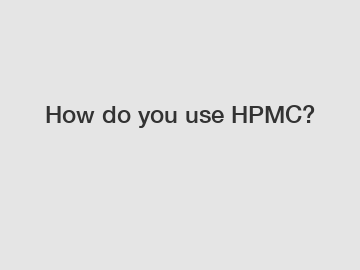How do you use HPMC?
Google hot topics around the keyword "How do you use HPMC?".
- What is HPMC?
- Benefits of using HPMC.

- Applications of HPMC.
- How to use HPMC in various industries.
Hydroxypropyl methylcellulose, commonly known as HPMC, is a versatile and widely used polymer in various industries. But how exactly do you use HPMC? This article will explore the benefits of HPMC, its applications, and how to use it effectively in different industries.
What is HPMC?
HPMC is a semisynthetic derivative of cellulose that is commonly used in the pharmaceutical, food, construction, and personal care industries. It is a white to off-white, odorless, and tasteless powder that is soluble in water. HPMC is known for its thickening, binding, and film-forming properties, making it an essential ingredient in many products.
Benefits of using HPMC.
1. Improved stability and shelf life: HPMC is known for its ability to improve the stability and shelf life of products. It helps prevent ingredients from separating or settling, ensuring that the product remains consistent and effective over time.
2. Enhanced texture and viscosity: HPMC is a versatile thickening agent that can be used to adjust the texture and viscosity of products. It helps create a smooth and creamy consistency in creams, lotions, and other products.
3. Film-forming properties: HPMC is widely used in the construction industry as a binder and film-forming agent. It helps improve the adhesion and workability of building materials, such as adhesives, grouts, and mortars.
Applications of HPMC.
1. Pharmaceutical industry: HPMC is commonly used in pharmaceutical formulations as a binder, disintegrant, and film-former. It helps improve the solubility and bioavailability of active ingredients in tablets and capsules.
2. Food industry: HPMC is used in the food industry as a thickener, stabilizer, and emulsifier. It helps improve the texture and mouthfeel of products such as sauces, dressings, and baked goods.
3. Construction industry: HPMC is a key ingredient in construction materials such as tile adhesives, grouts, and mortars. It helps improve the workability and strength of these materials, making them easier to use and more durable.
How to use HPMC in various industries.
1. Pharmaceutical industry: In the pharmaceutical industry, HPMC is commonly used as a binder in tablet formulations. It can also be used as a film-forming agent in coatings for tablets and capsules. To use HPMC effectively, it is important to carefully follow the recommended dosage and mixing instructions.
2. Food industry: In the food industry, HPMC is often used as a thickener in sauces, dressings, and other products. It can also be used as a stabilizer in dairy products and desserts. When using HPMC in food products, it is important to consider the desired texture and viscosity, as well as any regulatory requirements.
3. Construction industry: In the construction industry, HPMC is used as a binder and film-forming agent in tile adhesives, grouts, and mortars. It can also be used as a thickener in cement-based products. To use HPMC effectively in construction materials, it is important to follow the manufacturer's instructions and ensure proper mixing and application.
In conclusion, HPMC is a versatile and essential ingredient in various industries due to its thickening, binding, and film-forming properties. By understanding the benefits of HPMC, its applications, and how to use it effectively in different industries, manufacturers can harness the full potential of this versatile polymer.
Are you interested in learning more about HPMC for gypsum plaster, how to make HPMC solution, chemical HPMC manufacturer? Contact us today to secure an expert consultation!
200
0
0

Comments
All Comments (0)